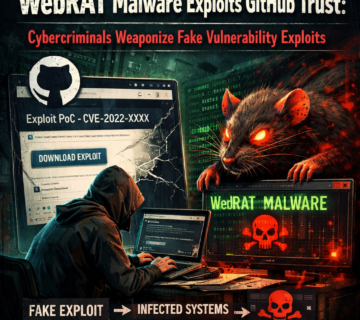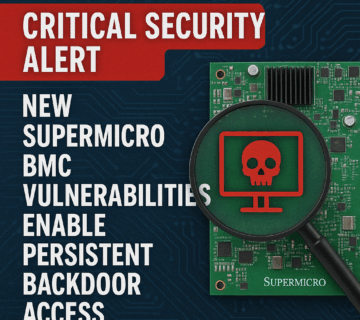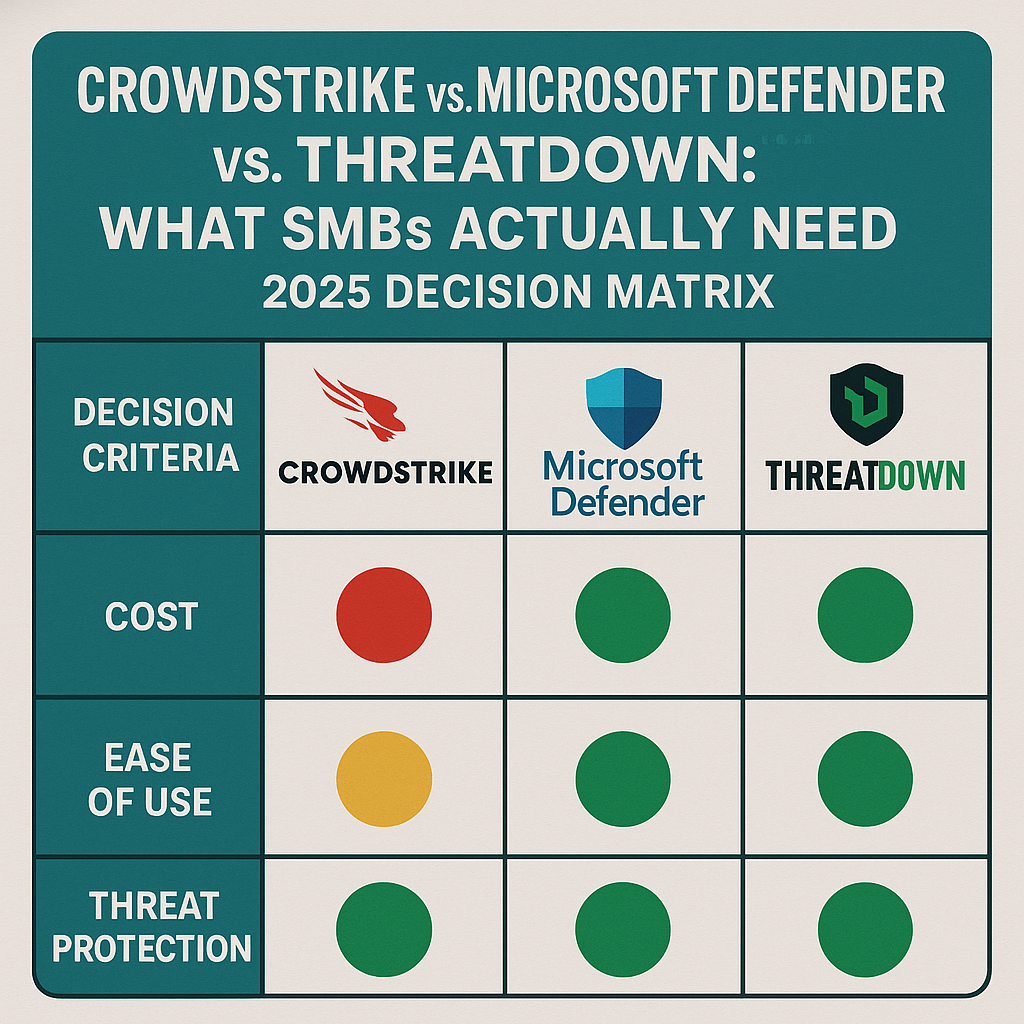Rhadamanthys Infostealer Operators Lose Control of Servers: Major Cybercrime Operation Disrupted
🎙️ Dive Deeper with Our Podcast!
Rhadamanthys Infostealer Disruption and Business Cybersecurity
The cybersecurity landscape just witnessed a significant development that should give business owners some relief. The notorious Rhadamanthys infostealer operation has been severely disrupted, with cybercriminals who subscribed to this malware-as-a-service losing access to their command servers. This disruption appears to be the result of coordinated law enforcement action, marking another victory in the ongoing battle against cyber threats that target businesses worldwide.
For Southern California businesses, particularly those in Orange County, this development highlights both the persistent threats facing organizations today and the importance of maintaining robust cybersecurity defenses. While this specific threat has been neutralized, understanding how these operations work helps businesses better protect themselves against similar attacks.
Understanding the Rhadamanthys Threat
Rhadamanthys represents a sophisticated type of malicious software designed specifically to steal sensitive information from infected computers. This infostealer targets credentials stored in web browsers, authentication cookies, email client passwords, and login information from various applications. Once installed on a victim’s system, it silently harvests this data and sends it back to the attackers.
What makes Rhadamanthys particularly dangerous is its distribution method. Cybercriminals behind this operation used several deceptive tactics to infect unsuspecting users. They promoted fake software cracks, created misleading YouTube videos that promised free software, and purchased malicious search advertisements that appeared legitimate. When someone clicked these links or downloaded what they thought was legitimate software, they unknowingly installed the infostealer on their system.
The business model behind Rhadamanthys follows the increasingly common malware-as-a-service approach. Rather than selling the malware outright, the developers operated on a subscription basis. Cybercriminals paid monthly fees ranging from hundreds to thousands of dollars to access the malware, receive technical support, and use a web panel that collected all the stolen data. This subscription model lowered the barrier to entry for less technically skilled criminals while providing steady revenue for the developers.
The Disruption: How Cybercriminals Lost Their Infrastructure
The disruption began when multiple subscribers to the Rhadamanthys service noticed something alarming. They suddenly lost SSH access to their control panels, which are the web-based interfaces they used to manage stolen data and control infected computers. The login requirements had mysteriously changed from standard password authentication to certificate-based authentication, effectively locking out the legitimate operators.
Panic spread through underground hacking forums as affected cybercriminals shared their experiences. One subscriber posted warnings that the server login method had been changed to certificate mode, urging others to immediately check their systems. They specifically mentioned German police activity, suggesting law enforcement had gained access to the infrastructure.
Another affected criminal confirmed these concerns, stating that “guests” had visited their server and removed the root password. They reported being forced to delete everything and shut down their server immediately. According to their account, those who used the automated “smart panel” installation were hit hardest, while manual installations may have escaped detection.
The Rhadamanthys developer acknowledged the breach in messages to subscribers, indicating their belief that German law enforcement was responsible. Evidence pointed to German IP addresses accessing web panels hosted in European Union data centers shortly before the cybercriminals lost control. The Tor onion sites used by the operation also went offline, though no official police seizure banner has appeared yet.
Operation Endgame: The Bigger Picture
Cybersecurity researchers monitoring the situation believe this disruption likely connects to Operation Endgame, an extensive international law enforcement initiative targeting malware-as-a-service operations. This coordinated effort has already achieved multiple successes against various cybercrime infrastructure.
Operation Endgame has previously disrupted numerous malware operations, including major players like SmokeLoader, DanaBot, IcedID, Pikabot, Trickbot, Bumblebee, and SystemBC. The initiative has also targeted ransomware infrastructure and the AVCheck site used by cybercriminals. The timing of the Rhadamanthys disruption appears significant, as the Operation Endgame website currently displays a countdown timer indicating new action will be announced shortly.
While German police, Europol, and the FBI have not officially confirmed their involvement in the Rhadamanthys disruption at this time, the evidence strongly suggests coordinated international law enforcement action. This approach reflects a broader strategy of disrupting cybercrime infrastructure rather than just prosecuting individual criminals.
What This Means for Orange County Businesses
The disruption of Rhadamanthys demonstrates that law enforcement agencies are making meaningful progress against cybercrime operations. However, business owners should not interpret this as a signal to lower their guard. When one malware operation gets disrupted, others typically emerge to fill the void. Cybercriminals continuously adapt their tactics and develop new tools to exploit vulnerabilities.
Infostealers like Rhadamanthys pose particularly serious risks to businesses because they target the credentials employees use daily. When attackers steal authentication cookies, they can bypass multi-factor authentication and access accounts as if they were legitimate users. This stolen information gets sold on dark web marketplaces, where other criminals purchase it to conduct further attacks, including business email compromise, wire transfer fraud, and ransomware deployment.
The methods used to distribute Rhadamanthys remain common across many malware families. Employees searching for software solutions, watching tutorial videos, or clicking on seemingly legitimate advertisements can accidentally download malware. These infection vectors highlight why security awareness training and robust endpoint protection are essential for every organization.
Southern California businesses face the same cyber threats as organizations anywhere else in the world. The interconnected nature of modern business operations means a security breach at one company can create ripple effects throughout their customer base and supply chain. Protecting your organization requires a comprehensive approach that addresses both technical defenses and human factors.
Frequently Asked Questions About Infostealer Threats
What exactly does an infostealer do to my business systems?
An infostealer is malicious software that specifically targets and extracts sensitive information from infected computers. It focuses on credentials stored in browsers, authentication tokens, email passwords, cryptocurrency wallets, and login information from various business applications. Once installed, it runs quietly in the background, collecting this data and transmitting it to attackers. For businesses, this means employees’ work credentials, client information, and access to company systems could all be compromised without anyone noticing until the damage is done.
How can I tell if my business has been affected by an infostealer?
Detecting infostealer infections can be challenging because they’re designed to operate stealthily. Warning signs include unexpected account lockouts, password reset requests employees didn’t initiate, unusual login attempts from unfamiliar locations, and accounts accessing resources they normally wouldn’t. Some employees might notice their browsers running slower or behaving strangely. However, many infections show no obvious symptoms, which is why regular security monitoring and professional cybersecurity assessments are crucial for detection.
Are Mac computers and mobile devices safe from these threats?
While many infostealers historically targeted Windows systems, modern variants increasingly affect Mac computers, Linux systems, and mobile devices. Cybercriminals follow the money and user base, so as more businesses adopt diverse technology environments, malware developers adapt their tools accordingly. No operating system provides complete immunity from these threats. Every device that accesses business systems needs appropriate security measures regardless of the platform.
What happens to stolen credentials after they’re harvested?
Stolen credentials follow a well-established underground economy. Attackers typically sell this information on dark web marketplaces, where it’s categorized by value. High-value targets like financial services credentials, email accounts with business access, or remote desktop connections command higher prices. Buyers might use these credentials immediately for fraud, hold them for future attacks, or resell them to other criminals. This creates a cascading effect where one initial infection can lead to multiple separate attacks on your business over time.
Can multi-factor authentication protect my business from infostealer attacks?
Multi-factor authentication (MFA) provides important protection, but it’s not foolproof against advanced infostealers. Some sophisticated malware can steal authentication cookies and session tokens, which allow attackers to bypass MFA by essentially hijacking an already-authenticated session. That said, MFA significantly raises the bar for attackers and blocks many common attack methods. It remains an essential security control that every business should implement, but it works best as part of a comprehensive security strategy rather than as a standalone solution.
How long does it take to remove an infostealer infection?
The remediation timeline depends on several factors, including the extent of the infection, how long it went undetected, and what information was compromised. Simply removing the malware from infected systems is only the first step. Businesses must also reset all potentially compromised passwords, revoke authentication tokens, review access logs for unauthorized activity, and assess what data may have been stolen. A thorough response can take days or weeks, especially if the infection spread across multiple systems. This is why prevention and early detection are so much more valuable than dealing with an active incident.
What should I do if I suspect my business has been infected?
If you suspect an infostealer infection, immediate action is critical. First, disconnect affected systems from your network to prevent further data theft or lateral movement to other computers. Don’t turn off the computer completely, as this might erase valuable forensic evidence. Contact cybersecurity professionals who can properly analyze the infection and guide your response. Begin planning for credential resets across potentially affected accounts, but coordinate this with security experts who can determine the full scope of compromise. Document everything for potential insurance claims and regulatory reporting requirements.
How Technijian Can Help
At Technijian, we understand that the disruption of operations like Rhadamanthys offers only temporary relief. New threats constantly emerge, and cybercriminals quickly adapt their tactics. That’s why we provide Orange County businesses with comprehensive managed IT security services designed to protect against both current and future threats.
Our cybersecurity team implements multiple layers of defense to protect your business from infostealer malware and similar threats. We deploy advanced endpoint detection and response solutions that identify suspicious behavior patterns before malware can steal your credentials. Our security monitoring services watch for the warning signs of compromise, including unusual login patterns, data exfiltration attempts, and command-and-control communications that infostealers use to transmit stolen information.
We also recognize that technology alone cannot solve security challenges. Our security awareness training programs educate your employees about the tactics cybercriminals use to distribute malware, including fake software offers, malicious advertisements, and deceptive YouTube videos. When your team knows what to look for, they become an active part of your security defense rather than the weakest link attackers exploit.
For businesses concerned about existing infections, we offer comprehensive security assessments that examine your environment for signs of compromise. Our team uses the same threat intelligence that tracks operations like Rhadamanthys to identify indicators of infection others might miss. If we discover a problem, we don’t just remove the immediate threat—we help you understand how the infection occurred and implement controls to prevent recurrence.
Our Microsoft 365 security services ensure that your cloud-based business tools receive the same level of protection as your on-premises systems. We configure advanced authentication policies, implement conditional access controls, and monitor for the session hijacking techniques that allow attackers to bypass traditional security measures.
Technijian serves as your local cybersecurity partner right here in Irvine, providing the expertise of a large security firm with the personalized service and rapid response times that Southern California businesses deserve. We understand the unique challenges facing Orange County companies, from compliance requirements in regulated industries to the security needs of growing businesses that lack dedicated IT security staff.
Don’t wait for a security incident to reveal vulnerabilities in your defenses. Contact Technijian today to schedule a security consultation. We’ll assess your current security posture, identify gaps that could leave you vulnerable to threats like infostealers, and develop a practical security roadmap that fits your budget and business needs. Protecting your business from cyber threats is what we do best—let us show you how comprehensive IT security can give you peace of mind while you focus on growing your business.
About Technijian
Technijian is a premier Managed IT Services provider in Irvine, specializing in delivering secure, scalable, and innovative AI and technology solutions across Orange County and Southern California. Founded in 2000 by Ravi Jain, what started as a one-man IT shop has evolved into a trusted technology partner with teams of engineers, AI specialists, and cybersecurity professionals both in the U.S. and internationally.
Headquartered in Irvine, we provide comprehensive cybersecurity solutions, IT support, AI implementation services, and cloud services throughout Orange County—from Aliso Viejo, Anaheim, Costa Mesa, and Fountain Valley to Newport Beach, Santa Ana, Tustin, and beyond. Our extensive experience with enterprise security deployments, combined with our deep understanding of local business needs, makes us the ideal partner for organizations seeking to implement security solutions that provide real protection.
We work closely with clients across diverse industries including healthcare, finance, law, retail, and professional services to design security strategies that reduce risk, enhance productivity, and maintain the highest protection standards. Our Irvine-based office remains our primary hub, delivering the personalized service and responsive support that businesses across Orange County have relied on for over two decades.
With expertise spanning cybersecurity, managed IT services, AI implementation, consulting, and cloud solutions, Technijian has become the go-to partner for small to medium businesses seeking reliable technology infrastructure and comprehensive security capabilities. Whether you need Cisco Umbrella deployment in Irvine, DNS security implementation in Santa Ana, or phishing prevention consulting in Anaheim, we deliver technology solutions that align with your business goals and security requirements.
Partner with Technijian and experience the difference of a local IT company that combines global security expertise with community-driven service. Our mission is to help businesses across Irvine, Orange County, and Southern California harness the power of advanced cybersecurity to stay protected, efficient, and competitive in today’s threat-filled digital world.





